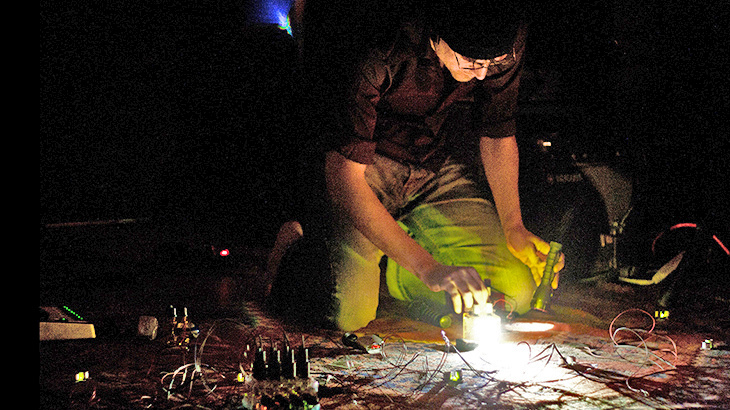Putting Listeners in a State of Timelessness
Musician, sound artist and composer Marko Timlin was guest at the ZKM | Institute for Music and Acoustics studios in spring, 2014. His work focuses on the technical and philosophical development of his sensor-sound machine, a sensor-based musical instrument. Marko Timlin began his artistic career in London at the beginning of the 1990s. His involvement with the alternative electronic music scene led him to former East Berlin, where, among other things, he founded the group tritop, one of Germany’s first live drum'n'bass groups. He currently lives and works as a freelance artist in Helsinki, where he develops sound installations, composes computer, theater and dance music, and holds workshops and seminars at colleges and universities.
Marie-Kristin Meier: What originally inspired you to work in the field of art in which you are currently active?
Marko Timlin: “The work with sound and the connection between technology, man and music have always been of interest me. I still remember when, as a drummer, I would completely rearrange studios during recording sessions just to find the right sound. At some point I began to feel dissatisfied with the music I was involved in at the time. I found it too schematic and predictable. When discovering literature, above all the literary work of Thomas Bernhard, Paul Celan and John Cage, I then came into contact with art and art music.”
M.-K. M. What role does the use of technology occupy in your work?
M. T. I’m convinced that one should only use digital technology when attempting to realize certain things otherwise impossible without such technology. I am radical on this point: Everything possible to achieve without the computer should definitely be produced without it. This then prompts the further questions: What can only be achieved with digital technology? How does the computer sound when it sounds like a computer?
In my view, the unique thing about technology in terms of sound is its defective character. I find the use of background noises of digital technology as musical source material to be very interesting. Systems mistakes – this is a very personal, aesthetic component: Discarded, broken electro-waste simply appeals to me. My aim is to extract something from this disposed material and artistically resuscitate it.
M.-K. M. Background noises are also the acoustic source material for your performances with sensor machines.
M. T. The generation of sound by sensor sound machines is based entirely on digital feedback. This is why I use a sound waste product which would otherwise be avoided, and which I must first find and generate with considerable effort. Concerts with the sensor sound machine take place in the dark. I can activate, control and alter sounds with light. I hold flashlights and diverse blinking objects, which I can switch on and off during the concert. The instrument also records the movements of my body: in other words, I can trigger sound with light while at the same time changing it by waving around my hand in the air. In this way, I generate sound structures which gradually change over time. It has to do with the transformation of sound in time. The most beautiful thing I can achieve with this is to put listeners in a state of timelessness.
M.-K. M. How should one picture these sound structures?
M. T. I am fascinated by natural phenomena, such as rain showers, with which a clear structure can be combined in endless permutations. With the sensor sound machine I am also able to generate sound structures within which there are constant variations. These sound structures barely seem to change, but then all of a sudden one finds oneself somewhere entirely different.
I would like to implement this concept even more radically in future: perhaps even sustaining one mood for an entire hour. The minimal, the repetitive with minor variations also results in one hearing things that do not even exist. This is what is so marvelous about abstract art: The audience or listeners are given the opportunity to interpret the work, and create their own works.”
Interview & text: Marie-Kristin Meier
News Category
- tracks & records
